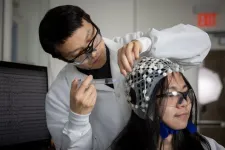(Press-News.org) ITHACA, N.Y. -- Humans make lots of irrational decisions in predictable ways, but what if we’re all just doing our best within the limits of our abilities?
Researchers were able to simulate human behaviors using a probabilistic finite automaton, a well-known model of limited computational power. They programmed the automatons to compete against each other in a wildlife poaching game, as either a rhino poacher or a ranger trying to stop the poaching.
When the automatons could remember everything, they settled into an optimal game strategy. But when researchers limited their memories, they took some decision-making shortcuts – the same kinds as actual humans playing the game.
This new work supports the idea of bounded rationality, that “sometimes we do silly things or make systemic mistakes, not because we’re irrational but because we have limited resources,” said first author Xinming Liu ’20. “Oftentimes, we cannot remember everything that happened in the past or we don’t have enough time to make a fully rational decision.”
Liu presented the work, “Strategic Play By Resource-Bounded Agents in Security Games,” in May at the 2023 International Conference on Autonomous Agents and Multiagent Systems. The senior author is Joseph Halpern, professor of computer science in the Cornell Ann S. Bowers College of Computing and Information Science.
In the poaching game, there are a handful of sites, each with a different probability of containing a rhino. In each round, the poacher and ranger choose a site to visit, making their decisions based on data from previous rounds. The poacher gains points by catching a rhino; the ranger gains points by catching the poacher.
If the poacher and ranger can recall every move in the game, they soon settle into Nash equilibrium – a rational, unchanging pair of strategies. But if the automatons have more limited memory – so they can’t remember where they saw that rhino 10, 100 or 1,000 rounds back – they make seemingly irrational human-like decisions.
One human behavior the automatons emulated was probability matching. This occurs when a person is guessing the results of a coin toss when the coin is weighted to be heads three out of four times. Instead of always guessing heads, which would give a 75% success rate, many people would guess heads three-quarters of the time, which would lower their success rate to about 63%.
In the game, this means the poacher made more visits to sites where they most often encountered rhinos in the past, and fewer visits to sites that rarely had a rhino. For the automatons, this strategy wasn’t ideal, but still yielded decent results.
Another irrational human behavior that led to good game performance was overweighting significant results – a phenomenon in which important or traumatic incidents loom especially large in the memory. For example, a person might drive slowly down a stretch of road where they received a speeding ticket many years ago.
When the researchers programmed the poachers to overweight previous encounters with the ranger, it paid off in the game. They ended up avoiding sites where the rangers were most likely to be.
To see how these results match up to actual humans, Liu recruited approximately 100 people to play as the poacher on an online platform. While some humans chose the same site every time or picked randomly just to finish the game and receive payment, others chose sites purely based on probability matching. A third group assumed the ranger was probability matching, and visited sites accordingly to avoid the ranger.
The similarities in gameplay between the humans and automatons show that the model can re-create at least two human behaviors, which, instead of being irrational, actually improved their performance.
“Another way to interpret it is to say that you’re doing the best you can given your computational limitations,” Halpern said. “And that strikes me as pretty rational.”
-30-
END
Game-playing automaton acts like an ‘irrational’ human
2023-07-10
ELSE PRESS RELEASES FROM THIS DATE:
Nearly two thirds of youth would stop vaping without added sweet flavors, menthol, synthetic cooling agents
2023-07-10
COLUMBUS, Ohio – Major progress could be made in fighting the youth vaping epidemic with a complete restriction on sweet flavorings and cooling agents in both cartridge and disposable e-cigarette devices, according to a new study from the Center for Tobacco Research at The Ohio State University Comprehensive Cancer Center. The current U.S. Food and Drug Administration (FDA) flavor ban only applies to cartridge electronic cigarette devices.
A new study published in the Journal of Studies on Addiction and Drugs by researchers ...
Girls Deliver: building an integrated, feminist ecosystem to support adolescent girls at the Women Deliver 2023 Conference
2023-07-10
July 10, 2023 — The Population Council’s GIRL Center, and co-hosts AFIDEP, AMPLIFY Girls, Baobab Research Programme Consortium, Children’s Investment Fund Foundation, Coalition for Adolescent Girls, Exemplars in Global Health, FP2030, Girl Effect, Girls First Fund, Conrad N. Hilton Foundation, the National Democratic Institute (NDI), Plan International, PMNCH, Purposeful, Together for Girls, UNICEF, Women Deliver, and The World Bank Africa Gender Innovation Lab, are proud to host the “Girls Deliver: Pre-Conference on Adolescent Girls,” on July 16. This one-day global convening ...
Light-activated molecular machines get cells ‘talking’
2023-07-10
HOUSTON – (July 10, 2023) – One of the main ways cells “talk” to each other to coordinate essential biological activities such as muscle contraction, hormone release, neuronal firing, digestion and immune activation is through calcium signaling.
Rice University scientists have used light-activated molecular machines to trigger intercellular calcium wave signals, revealing a powerful new strategy for controlling cellular activity, according to a new study published in Nature Nanotechnology. This technology could lead to improved treatments ...
Biomarkers may hold key to precision mental health diagnosis, care
2023-07-10
The study of biomarkers in the brain—powered by cutting-edge machine learning techniques—could redefine the way mental health conditions are categorized and diagnosed and lead to more effective, personalized treatments.
That’s the goal of Yu Zhang, an assistant professor of bioengineering and electrical and computer engineering in Lehigh University’s P.C. Rossin College of Engineering and Applied Science who recently landed major support from the National ...
Navigating the future of underwater geolocalization: how polarization patterns enable new technology
2023-07-10
University of Illinois Urbana-Champaign researchers have developed a novel method for underwater geolocalization using deep neural networks that have been trained on 10 million polarization-sensitive images collected from locations around the world. This new study, led by electrical and computer engineering professor Viktor Gruev, along with computer science professor David Forsyth, enables underwater geolocalization using only optical data while providing a tool for tethered-free underwater navigation.
These findings were recently published in the journal eLight.
“We are showing for the first time, you can geolocate yourself, or a camera, in a number of different ...
Anastasopoulos receives funding for EAGER: building language technologies by machine reading grammars
2023-07-10
Antonios Anastasopoulos, Assistant Professor Computer Science, received $99,294 from the National Science Foundation for: "EAGER: Building Language Technologies by Machine Reading Grammars." This funding began in June 2023 and will end in late May 2024.
Anastasopoulos said, "This project aims to explore the feasibility of building language technologies while bypassing the need for exorbitant amounts of data, instead turning to already-codified linguistic knowledge. This is of particular importance for bridging the language technology gap for underserved communities: ...
Ungvari & Nichols securing core support for International Global Change Research
2023-07-10
Judit Ungvari, Research and Innovation Officer, Institute for a Sustainable Earth, and Leah Nichols, Executive Director, Institute for a Sustainable Earth, Research and Innovation Initiatives, received $277,602 from the National Science Foundation for: "Collaborative Research: Core Support for Future Earth International Global Change Research."
The grant will provide salary to support Ungvari’s work, travel funds, and support costs for participants to attend annual Sustainability Research and Innovation congresses where the Future Earth assembly occurs.
This funding began in May 2023 and will end ...
Conservation in Indonesia is at risk, a team of researchers who study the region argues
2023-07-10
Indonesia, home to the largest tropical rainforest in Southeast Asia and over 17,500 islands, is a country packed with biodiversity and endangered species. However, scientists studying the region’s species and ecosystems are getting banned from Indonesia, and conservation plans are being blocked. In a letter publishing in the journal Current Biology on July 10, a team of conservation researchers with long-term experience in Indonesia discuss scientific suppression and other research challenges they have witnessed while working in the region. They offer suggestions for how to promote nature conservation, protect data ...
Breathing poison: Microbial life on nitric oxide respiration
2023-07-10
Nitric oxide (NO) is a fascinating and versatile molecule, important for all living things as well as the environment. It is highly reactive and toxic, organisms use it as a signaling molecule, it depletes the ozone layer in our planet’s atmosphere, and it is the precursor of the greenhouse gas nitrous oxide (N2O). Moreover, NO might have played a fundamental role in the emergence and evolution of life on Earth, as it was available as a high-energy oxidant long before there was oxygen.
Thus, despite its toxicity, it makes perfect sense that microbes use NO to grow. However, research on the topic is scarce and, to date, microbes growing on it have not been cultivated. ...
Study shows same-sex sexual behavior is widespread and heritable in macaque monkeys
2023-07-10
Observations of a wild colony of macaques over three years show same-sex sexual behaviour among males is widespread and may be beneficial.
The results, published today in Nature Ecology and Evolution, suggest same-sex sexual behaviour (SSB) has evolved and may be a common feature of primate reproduction.
Conducted by researchers at Imperial College London, the observations and genetic data form the first long-term study of SSB in males within one species. Their study challenges the beliefs of some that SSB is a rare behaviour in non-human ...




